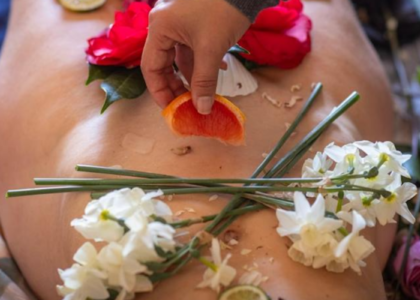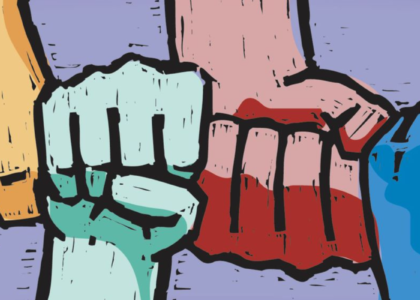“I would love a collection of their wisdom…but they’re recorded nowhere”
Amy is joined by author Celeste Davis to discuss the long history of Mormon feminism, how women’s stories have been erased and hidden, and what hope remains for an egalitarian future in the LDS Church.
Our Guest
Celeste Davis

Celeste Davis is the writer behind the popular Substack ‘non-spiritual non-direction’. She is a certified spiritual director through the Chaplaincy Institute, specializing in LDS faith transitions. She lives in Spokane, Washington with her husband and four kids.
The Discussion
Amy Allebest: People often ask me what led me to the work that I do. Some people assume that because I was raised after the women’s liberation movement of the 1970s, that I was indoctrinated with feminism as a child. The truth is that I never even heard the word feminism growing up, not for good or for bad. I never knew a single feminist name, and I never saw a single woman in my life speak out in complaint about injustice. But there were injustices, and as a young adult I began noticing that I had accumulated a lifetime of painful experiences watching women be mistreated in ways big and small, always enduring them in silence. I found myself frequently sobbing on my bedroom floor or in my car, wracked with cognitive dissonance.
In 2013, during one of these episodes of weeping on my knees, praying to God to help me to know what to do with the information that I had been learning about women’s oppression, I asked, “Is it okay for Mormon women to speak out?” I immediately felt calmer, and a few minutes later wandered over to my computer to look something up, and ended up clicking a chain of links that led me to an article that sent chills down my spine. It was a speech by Claudia Bushman that was titled ‘Should Mormon Women Speak Out? Thoughts on Our Place in the World’. That article was all I needed to set me on a course that I am continuing today. But though I have one of the OG Mormon feminists, Claudia Bushman, to thank for that journey, I actually still don’t know very much about the history of Mormon feminism. So, I am so excited to welcome Celeste Davis to teach us about that very topic. Welcome, Celeste!
Celeste Davis: Thanks, Amy! I am so excited to be here.
AA: I’m so excited to have you. I’ll introduce you professionally, as usual, and then I’ll have you introduce yourself more personally afterwards. Celeste Davis is the writer behind the popular Substack non-spiritual non-direction. She is a certified spiritual director through the Chaplaincy Institute, specializing in LDS faith transitions. She lives in Spokane, Washington with her husband and four kids.

And I have to say, Celeste, I was just saying this to you before we started the episode, but I had not heard of you until recently, and now I cannot get enough of your work. I’ve been reading everything that you’ve written on Substack. I saw an episode on Mormon Stories and listened to another episode on Radio West just in the last week as we’ve had some incidents going on at the time of recording. This is the beginning of April of 2024, and I’m just so, so impressed with your scholarship and can’t wait to learn from you today. So, thanks again for being here.
CD: Well, I have to say, Amy, I can’t overstate how much your podcast has meant to me. Truly, I can remember specific places in my city, specific walks that I was on, in specific moments, listening to your podcast and having lightbulb moments and epiphanies. And I think that’s very apropos of what we’re going to be talking about today, of the real, true importance of feeling like you’re not crazy for having the thoughts and feelings that you have that you don’t hear the women around you vocalizing. And your podcast has been such an important stepping stone for me and outreach for me to the past that I had no idea about. Women’s voices from the 1800s and 1700s and far before that, even. It is so validating and so important to me personally. So, thank you so much for all the work that you do.
AA: Thank you for that. That sunk right into my heart and I’m so, so grateful. Because, as you know from listening to the podcast, it was a journey that I felt like a lot of us were going on together. It was all new to me too. So, hearing experiences like yours makes it all worth it and it means so much. Thank you, Celeste. Well, I’d love it if you could start us off by telling us about you, where you’re from, and some of the factors that influenced who you’ve become today and the work that you do.
CD: Sure. I grew up in Allen, Texas in a very devout LDS family. I went to BYU, went on a mission, had four kids, married in the temple, all of the things. And I definitely grew up in a family surrounded by women who did not complain about LDS anything surrounding women’s work or being in the home, especially not anything about the Church or the brethren or anything like that. And just recently I was reading through my great-grandmother’s personal history, which is about 25 pages. My great-grandmother was the daughter of a polygamous relationship, a second marriage, and she had such a hard upbringing. They had to go into hiding, and in her personal history she is trying so hard to never complain, going out of her way to never say one negative thing about her life, about her role as a woman, especially about the Church.
And she has this one paragraph that I kind of clung to, of when she went to visit my grandmother in Pittsburgh to help with the birth of her first daughter, and how she had all of this freedom. She was there for a month and she would just go out and walk through Pittsburgh, and had all this time, and she was the happiest that she had ever been. And then she wrote to her husband and her husband got mad and was offended and told her to come home. And then she’s like, “Oh no, but I love my husband! I love my life!” It was so sad that she couldn’t really complain or speak out against anything. So that’s a little bit about my personal background.
And now I am a spiritual director, so I meet with clients every week, mostly women working through their own empowerment issues. And I’m just thrilled. I love that work. I love being able to get a front row seat to women prioritizing their own desires and their own sovereignty. It’s lovely work. And I’m a writer, I write on Substack and Instagram.
AA: Awesome. And again, I highly, highly recommend Celeste’s writing. Check out her Substack. And Celeste, what’s your Instagram account called so people can find it?
CD: Everything is Celeste M Davis. So substack.com/celestemdavis, my website is celestemdavis.com, and my Instagram handle is @celestemdavis.
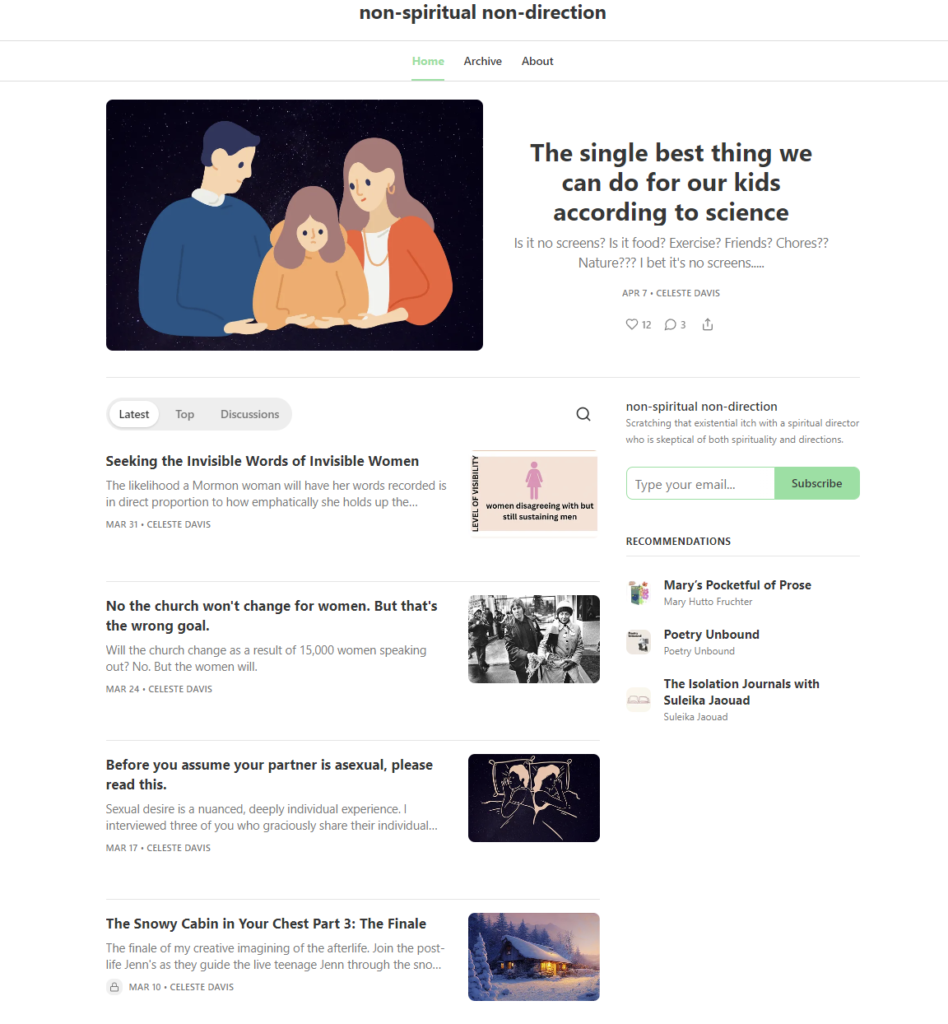
AA: Perfect. Awesome. Well, let’s get into this subject of Mormon women’s history through an entry quote that’s familiar to both of us, this concept of reinventing the wheel. This is a concept that was new to me, and I heard it for the first time from Gerda Lerner in her book, The Creation of Feminist Consciousness. It’s a quote that I’ve shared often on the podcast, where Lerner describes how women suffer as they start to see the inequities in their daily lives and it starts to create friction in their minds and in their relationships and in their emotional world. One of the hardest things is that they feel completely alone and that they feel crazy, like you said. They don’t have language to describe what they’ve been going through, and so they start from scratch and don’t realize that generations upon generations of women have had that exact same experience, and yet it can’t benefit them because they haven’t learned anything about it. So I wanted to ask you, I guess we’ll use this big concept but in a specifically Mormon context. My first question for you is, why does this happen and what does it look like for Mormon women?
CD: Yes, I’ll kind of tell my tale and then generalize it out. When I was going through my spiritual direction training program, we talked a ton, we had lots of breakout groups, we were very familiar with each other’s pasts. So I talked about Mormonism all the time, and God wounds, and all the things. And there was a woman in my class who’s in her 60s, she lived in California, and every time I talked about Mormonism, she’d be like, “Did I tell you I heard Sonia Johnson speak? I went to hear her speak. She was amazing.” And then a couple of weeks go by, she’s like, “Did I tell you I have Sonia Johnson’s book on my bookshelf? It’s right here.” She was so impactful to me, she was so great. And eventually, after months of this, I finally came clean. I was like, “Irene, I’ve actually never heard of Sonia Johnson, I’m sorry.” And she looked at me like she must’ve misunderstood. She was like, “She’s like the most famous– she was on the news! She ran for president!” And I had never heard of her, and she was Mormon, and this was her only touch point to Mormonism. And so I was like, “Sorry!”
And the next day I went out and I bought her book, and I read it, it’s called From Housewife to Heretic. And my jaw was on the floor the entire book. I was like, “How have I never heard of Mormons for the ERA?” The ERA stands for Equal Rights Amendment, and they fought to get that ratified into the Constitution, to recognize women in the Constitution. I had never heard of that. I had never heard of literally any of the women that were in this book. And this happened around 1980, Sonia Johnson was excommunicated for her involvement in the Mormons for the ERA movement. And I had never heard of any of the powerhouse women that pushed back and said, no, what the Mormon Church is doing right now– they were very, very secretive but extremely influential in not getting The ERA ratified in many different states, and many movements, asking like ten women from each ward to go vote against it, sometimes going door to door. Sonia Johnson was speaking out against that. I had never heard of her.
At the same time, I was reading Terry Tempest Williams’s book When Women Were Birds, and here was another powerhouse, a woman raised Mormon whom I had never heard of. And she has this quote in her book of listening to her grandma and her mom talk at the table, and her grandma saying, “We are at a fork in the road for women in the Church. Things have to change or all the women will leave. This cannot continue.” And that was in the 1960s. It was so jarring to me because again, I just told you about reading my grandma’s personal history, reading my great-grandma’s personal history, however far back, all of the histories, none of them voiced concern. None of them made me feel seen and heard in my concerns. So to be reading this from these women that I had been kept from their history was really sad to me.
And at the time, this was around 2022, about two or three years ago, the Heavenly Mother movement felt extremely new. All of these Instagram accounts were popping up and gaining all these thousands and thousands of followers for talking about Heavenly Mother. And I don’t remember growing up hearing anything about Heavenly Mother, so I just assumed that this was a new movement and new push-back. Elder Renlund in conference spoke out against praying to Heavenly Mother. I thought that was a new pushback. And then to read in Sonia Johnson’s book, no, no, no, she was asking the First Presidency, “Can we pray to Heavenly Mother? Have you prayed about it? Why?” They were writing letter campaigns, they were saying Heavenly Parents, they were excited. They were just on the cusp of change for the Church for women, led by an honoring of Heavenly Mother. And then to learn about the pushback there and the home visits from apostles silencing women, telling them specifically not to talk about Heavenly Mother, I was like, how did I not know this? And I think of myself as being well-read and completely involved in the Church my entire life, not uneducated on Church history. I had never heard of these women, never heard their names, never heard their stories. And they were having the exact same conversations that I saw every day on Instagram, and it just blew my mind.
AA: Yeah, I had a similar experience. The two things that come to my mind, I had a parallel experience about Sonia Johnson. Some people say sewn-nia, and some say sahn-nia. Does she say sahn-nia? Maybe I’ve heard it mispronounced.
CD: Oh, I just have a good friend named sahn-nia, so I say sahn-nia, but it’s probably sewn-nia.
AA: It’s one of the two. Say it how you want, I guess, listeners. But I had the same thing, except it was a negative spin. It’s my mother-in-law, actually, so I’ll be very careful how I tread here. My mother-in-law didn’t know that her son was marrying who I turned out to be. Although neither did I, to be fair. I didn’t know who I would turn out to be either. But I remember that she would bring up Sonia Johnson, but in a way that I thought, like, “Oh, that’s the devil incarnate,” but I didn’t know who it was and was kind of too embarrassed. Or I’d think, like, she’s acting like I should know so maybe I do know, and then the moment would pass. But it happened many, many times. And finally, like you, I was like, “Who’s Sonia Johnson? I don’t know who that is.” And she was shocked as well. But I was too little, I was born in 1977. And like I said, in my family, my parents never, ever mentioned feminism. They’re not a very politically minded family. So we had like a forcefield bubble over our home, and I had no idea the second wave of feminism had even happened. I don’t think my mom knew it had happened either, for good or ill. Erik, my husband, was raised in a very different family where he heard a lot about feminists as he was growing up and how horrible they were. And Sonia Johnson was really truly doing the devil’s work on earth.
I had never heard of these women, never heard their names, never heard their stories. And they were having the exact same conversations that I saw every day…
And then the other thing was that I was an English major at BYU starting in 1995. And I just happily went through my English program in the mid to late-nineties, and it was decades later that I learned about the September Six and how there were, in the English department at BYU, professors excommunicated for advocating for praying to Heavenly Mother, like you mentioned. And I just thought, wow, it’s like a nuclear bomb went off at BYU, specifically in the English department, and they cleaned that place up and whitewashed the walls, and I came in never knowing that anything had happened. And I thought back to a lot of my professors, especially the women, and thought they probably sensed an atmosphere of real fear and being careful how they were speaking to us. And I never even knew. Anyway, the Church does a good job of cleaning things up, and they create this situation where each generation is born not being able to benefit from the wisdom of their past generations.
I wonder, really quickly, and I do mean quickly, I know it’s impossible to summarize something so vast in a short amount of time. But for listeners who aren’t very familiar with specific LDS patriarchy, are there a couple of bullet points that you could give us about patriarchal policies and practices that have challenged women through the years that listeners might not know? They may be more familiar with a Catholic or an Orthodox Jewish context, but not LDS specifically.
CD: Sure. I can give you a list of things that women have repeatedly asked for in letter-writing campaigns to the brethren over and over and over again for the past 70 years. They would like for the women in leadership roles to be sitting up on the stand. The stand is the raised platform in front of a congregation, and the men in the bishopric and stake presidency always sit up there in the front, but the women do not. They don’t have that visual representation. People are asking for more women speakers at General Conference. The average currently is about 33 men speakers to two women speakers.
AA: Let’s say what General Conference is, too.
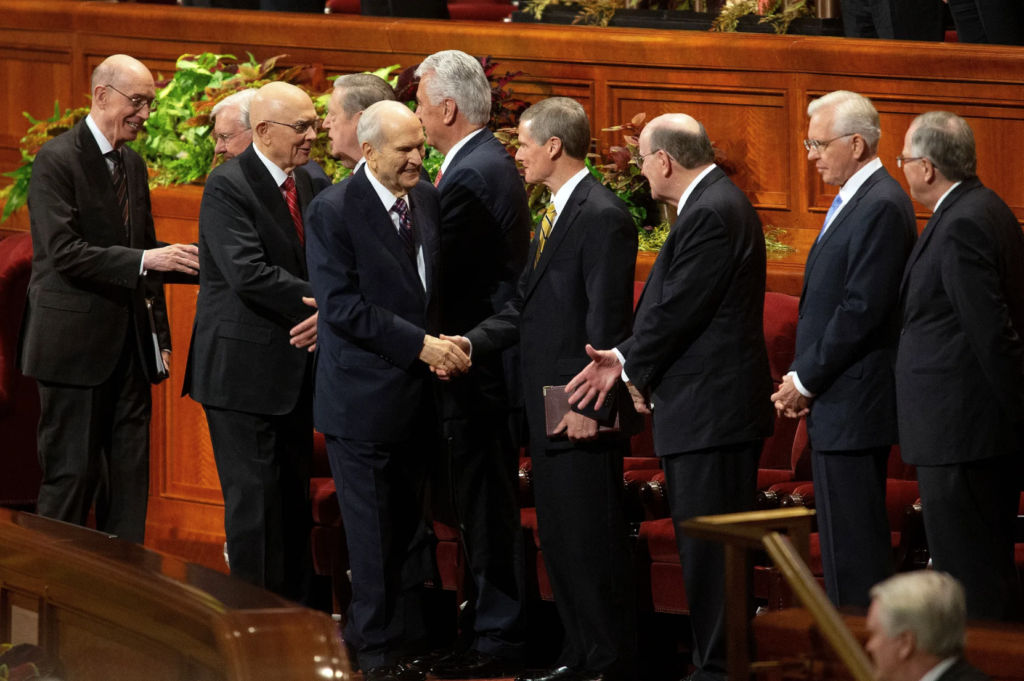
CD: General Conference is a meeting of the Church twice a year that members tune into from all over the world. It happens in Salt Lake City in the Conference Center, where the leaders of the Church speak to us. Women are asking for equal budgets for the youth programs. Currently, in many wards, the Young Men’s program, the teenage boys have a higher budget and more money for high adventure and other things than the Young Women’s programs. And they’re asking to examine all church positions to see if they can be filled without regard to gender. We just have a lot of tradition in the Church to have Sunday school presidents be men, for instance, when there’s no priesthood reason for that. Or executive secretary, or the clerk, or the ward mission leader, lots of different positions that are held by men that could be held by women. Women have been asking to hold their own babies during blessings for decades, and just to be able to bless in general, which the women in the early Church were able to do. Many women do not know that, but they were able to give blessings of comfort and healing, and women want that again.
AA: I’ll just say, too, or you can describe, Celeste, a visual image of what that looks like, a baby blessing or a blessing of healing or a blessing of comfort. Do you want to describe that visually?
CD: Yes. For all blessings, men anoint your head with oil and they lay their hands upon your head, either two men, three men, a group of men, and they can give you a blessing for if you’re sick physically or for any reason, really. And women aren’t able to do that. And for baby blessings, they all hold the baby in the middle of this circle, and there’s no reason why a woman couldn’t hold the baby herself, but it’s just not allowed. And I’d say in general, they are asking to be in rooms where decisions are being made, whether that’s in bishopric meetings and high council meetings or at Church headquarters on the Church’s committees.
AA: Yep, thank you. And that was the brief version, because there are nuances and little details under the umbrella of all of the topics that you listed. But that was a great way to acquaint listeners who aren’t familiar with some of the big talking points. And like you said, people don’t know that that’s been a talking point for decades. It feels new for every single generation, so let’s start talking about that. I’d love it if you could pick just a few women to highlight, of the many, a few women that you’ve been learning about, and tell us the context that they were operating in, what were the major issues of the day, and tell us about their work.
CD: Sure. There are three main waves of Mormon feminism. The first occurred in the early Church, in the mid-1800s, and the women’s organization, the Relief Society, had far less male oversight than we do today. They were more independent and they were able to write their own words. They had a publication called The Exponent, where men were not editing it, they weren’t correcting it. They were able to publish it and distribute it on their own. And that was huge, because what they were talking about in that Exponent magazine, they were really at the cusp of the women’s equality issues of the day. They weren’t just progressive for a Mormon world, they were progressive for the world. They were talking about women getting the right to vote way before people on the East Coast were talking about it and pushing for it. They were talking about women having the right to hold office, and they were talking about financial freedom for women, and those kinds of opportunities. That’s what this Exponent magazine was talking about.
And the woman I’ll highlight in this era is Emmeline Wells, the leader of the Relief Society in the Church. And she was also a leader in the whole country. She went to Washington, D.C. several times to represent Utah in national suffrage movements and she ran for the Utah Senate. She was actively pushing, I mean, of course she got pushback because this was new, and women asking for rights will always get pushback, but she held her own. And when she was wanting to open up women running for office in Utah, she had to go head to head with the men in office. I just cannot imagine today something similar playing out, with someone who’s running the Relief Society of the Church to be publicly challenging men. She would just not be put in that position. If she had a record of publicly challenging men, she wouldn’t be in charge of the Relief Society. So it’s kind of mind-blowing to imagine this totally different culture for women in the early Church. And again, this is after growing up in the Church my whole life, but it’s very recent news to me. So that was the first wave.
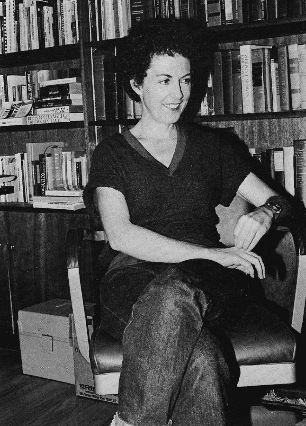
And then The Exponent magazine ended in 1914, and the Relief Society Magazine began in 1915, but that was with male oversight. It was edited and was very much correlated with the Church doctrines and quoting the prophets and apostles, and not talking about women’s equal rights movements anymore. And in this time in the Church, there was a lot of move to correlate everything. So feminist movements kind of go quiet. We don’t have a lot of writings, there’s not much from 1915 until the 1960s. And then the second wave happens in the ‘60s, when a group of women in Massachusetts, Claudia Bushman, whom you mentioned, they actually discover in one of the libraries at Harvard this old Exponent magazine from the early days of the Church. And their minds were blown. They had no idea they were so progressive. They were leading this movement for women’s suffrage, they were active in politics, publicly disagreeing with the brethren, and it just shocked them. So they started The Exponent II magazine, an independently published newspaper for women of the Church to be able to disagree. And that started in the ‘60s. And then in the late ‘70s, we have Sonia Johnson entering the scene. And she gained tons of national press, like at her excommunication there was ABC News, NBC News, People Magazine did a thing on her, she was on The Phil Donahue Show. She was just huge, she was a national public speaker. And she was a big mover in very publicized protests against the Church, which again, I knew nothing about. So, she got excommunicated in 1980, I believe, 1979.
And then as you mentioned, the September Six happened in 1993, where the BYU professors were excommunicated for trying to get these same exact things moving in the Church for women. And then I’d say the third wave happens in the early 2000s. The blog Mormon Feminist Housewives began in 2004. In 2012, a group led by Stephanie Lauritzen, she started Wear Pants to Church Day, which got national press again. Kate Kelly comes on the scene in 2013 with Ordain Women to try to get into the all-men priesthood meetings, and has 150 women try to get there. It was a peaceful protest situation. They were denied entry and access, and she was excommunicated in 2013.
AA: That was awesome. Thanks for laying the land for us and giving us the different waves and the major players. I want to drop in on a couple of these movements and ask some more questions. One thing that I wanted to ask is about the original Exponent and Emmeline Wells. I know she was friends with Susan B. Anthony, and like you said, she was a major national player. One thing that complicates that was, well, first of all, was The Exponent magazine primarily a suffrage magazine? To advocate specifically for women’s voting or was it all kinds of women’s issues?
CD: It was all kinds of women’s issues. They also talked a lot about polygamy, they talked a lot about the Church. It was a lot of different articles, but they did talk a lot about suffrage as well. It wasn’t a primarily suffrage magazine, I wouldn’t say.
AA: Okay. And another thing that complicates that first wave for me was, just from the little reading that I’ve done, is that these women were advocating for the vote partly so that they could vote to keep polygamy. And also I feel like the brethren were allowing them to vote so that there would be more Mormon voters so that they could continue practicing polygamy. What are your thoughts on that?
CD: That is true. This era is very, very complicated. I think the book A House Full of Females by Laurel Ulrich highlights that it was so nuanced and so complicated, this era of polygamy. Because on one hand, women leaders and the Church are vocally dissenting and they are at the front end of the national suffrage movement and getting women into office. And on the other hand, they are living with one of the most oppressive, silencing of women in terms of marriage and what’s going on there. And the voices that were dissenting against polygamy were largely not included in the words we have recorded, the words that were being microphoned out. So I think you’re absolutely right that the reason they were able to be handed the megaphone and get that stamp of approval by Brigham Young was because they were publicly in favor of polygamy, which is very complicated.
And in her book, Laurel Ulrich makes the point that the reason that these women were able to be so politically active and so free-thinking and so progressive was because they didn’t have the typical restraints of the usual household, were where the woman was beholden to be in service of the man in terms of cooking and cleaning. They had a lot more freedom and sometimes more community with other women because they were left alone a lot of the time. Like my great-grandma in her personal history, she saw her dad maybe once a year growing up, and her mom was just on her own. And that can be good. That was not good for her because she was impoverished and they didn’t have a way to eat, but for some women who were provided for, it provided a lot of freedom, a lot of time. Anyway, Ulrich makes the point that because of polygamy, they were able to gather together more and be more progressive, which is interesting. It’s just a complicated era.
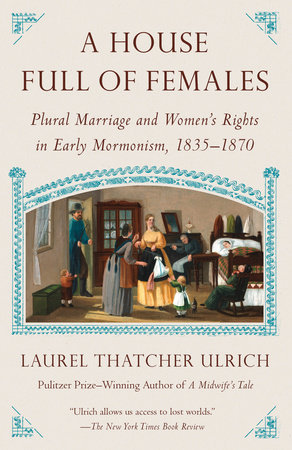
AA: It is. I remember, too, the anecdote that Brigham Young actually allowed women to go to medical school to get trained to be doctors. I mean, it was part of the purity culture that men should not be looking at women, but that we should have women OBGYNs, women midwives, so women need to be trained. But also the polygamous household meant that other women could care for her children while she’s away at medical school, or pitch in and do all of the housework. So it is complicated. There were some silver linings of polygamy, I guess. But the whole suffrage– It’s true! You have to acknowledge it. I hate it, it’s the worst, I’m not advocating for it at all. But it’s complicated! The narrative is complicated.
CD: I do feel the need to say for the record, I am against polygamy.
AA: Of course we’re both against polygamy!
CD: I just want that not on the record. Not a fan.
AA: Me too. Not a fan, not at all. Not even close to being worth it. Fair enough. Next, I did not realize until I read your Substack article, Celeste, that the group in Cambridge in the ‘60s, Claudia Bushman being among them and a bunch of other women, I knew they started Exponent II and I knew that they were modeling it after the original Exponent. Like, “Oh my gosh, here’s a women’s magazine!” but I didn’t realize it’s because they found it in the Harvard Library. That is such a cool story and such a great illustration of this whole concept. I can imagine, well, how I felt when I discovered all of these women who had had the exact same struggles and who labored to produce the same philosophical critiques that had cost me so much time and energy and thought, and be like, “People thought of this 200 years ago? What the hell?” I imagine that might’ve been part of their experience of having to wake up all on their own and see that our foremothers literally did this work. Can you tell us a little bit about that group? I think you mentioned in your article about the history and how one of the members of the Quorum of the Twelve flew out to talk to them and try to rein them in, right? But I know, for example, Claudia Bushman is the one I know the best. She has remained a devout member her entire life. Can you talk about that tension? Because as you said, this was an era where women were not given as much free rein as they had before. So, what was that tension between the leadership and their speaking out?
CD: There’s always been tension, for sure. The brethren have a long history of keeping a very close watch, a very tight rein on women gathering and women speaking, maybe because of the early days of the Church. I don’t know. But what was happening was that Richard Bushman, Claudia Bushman’s husband, had just started Dialogue magazine a few years prior. And sometimes the women would post there, and I don’t know whose exact idea it was initially, but somebody’s like, “Let’s do a full magazine just for women, The Exponent II.” Similar to Dialogue, a place for open discussion apart from the correlated institutionalization of the Mormon Church, just our own kind of thing. So The Exponent II magazine started and it was wildly popular. They were circulating the words of the early Mormon women, and very quickly they grew to about 4,000 subscribers. I mean, they were massively growing way beyond what they could even handle with printing and money, and they were mailing it out all over the country, even to other countries. Women were so hungry for this kind of thing. They grew so fast, there was so much interest in it. So yeah, it was L. Tom Perry that flew out. And it was just so telling that he allowed Richard to continue doing basically the same thing with Dialogue.
AA: True!
CD: And Claudia stepped down as a result. So she was not in charge of it for very long. She was initially, but she stepped down after that. I don’t know if she was involved, I’m not sure. But interestingly, I found this last night, a member of the general Relief Society board at that time, Alice Colton Smith, said that the members of the general Relief Society board were not permitted to subscribe to The Exponent II, and the brethren were not fans. They called it “Claudia Bushman’s Women’s Lib Magazine”. She said that they weren’t allowed to subscribe, but she and a few others did under a different name.
AA: Wow. I did not know this. That’s crazy. And I’ve never thought about that, that the Dialogue was already around. And, I mean, I know the Church probably has a very tense relationship with Dialogue as well, but there is kind of a give and take. In fact, there’s the story that an article in Dialogue magazine was instrumental and the tipping point that allowed Black men to get the priesthood. That article that was published in Dialogue was on President Kimball’s desk when he had the revelation to open the priesthood to all worthy male members of the Church. Though the brethren will never say that. They’ll never acknowledge that there was a grassroots influence. But I wonder, do you know for sure that no brethren ever flew out to chastise Richard Bushman and say “you can’t do Dialogue”? That is fascinating.
The brethren have a long history of keeping a very close watch, a very tight rein on women…
CD: I think it goes to show, it’s a good portrayal of this tightrope walk that you have to walk in order to publicly dissent against the patriarchy, against the brethren. Because the truth is that the women’s words that have been recorded and the stories that we have, the likelihood that a woman’s words will be recorded is in direct proportion to the extent that she emphatically holds up the patriarchy. And if she holds up the patriarchy and she quotes the men and she’s like, “Yes, prophet. Yes, everything. Yes, bishop. Yes, husband. I’m in for this system.” Those are the words that will get put like in the book Saints, for example. We don’t have women’s words in any scripture, so few women’s words compared to men’s words, but the women’s words we do have are the ones that quote the men. And again, to the extent that they hold up the men, that’s the likelihood that we have their stories or their words at all.
And I think it goes in three different tiers. There’s the top tier, the most women’s words we have in the Church are the ones who quote the brethren and hold up the patriarchal rule. Second tier, I would say, is this Mormon feminist, this progressive women’s words, and there is far, far, far less recording of that. But if you do some digging, you can still find that their words have been recorded in different places. Not publicized, not spread out through the Church, but you can find them. And then this third tier is the women who outright deny patriarchal rule, who outright disagree, who protest, who say no, and those words are very hard to find. And that’s why when women find them, they’re shocked. Like when I read Sonia Johnson’s book, I had never come across someone who was outright “No” to the prophet, “No” to this. We don’t have their words in any collections, especially years after they leave the Church.
And I don’t go to church anymore, but I would love their stories. I would love a collection of their wisdom decades out, but they’re recorded nowhere. I’m machete-ing my own way through my forest alone. I don’t have a path to follow like I did in the Church of like, “Here’s what the next stage of your life is going to look like. Now you’re going to go on a mission and now you’re going to do this.” I would love the words and the path and the wisdom of women who have invented the wheel before me, but they’re not saved in any collection. And in the Church, I clung to the words of Carol Lynn Pearson, who’s been in this movement since the ‘60s, writing and publishing her work, and other words of people like her. But there’s still this deference paid to the patriarchal rule, to the prophets, to patriarchy, basically. Because you have to play this game. If your words are going to get out there, you have no other choice but to pay that deference. Otherwise you will be erased. And we have so many examples of women being silenced, of women being excommunicated for dissenting, and so you have to play the game if your words are going to get out there at all.
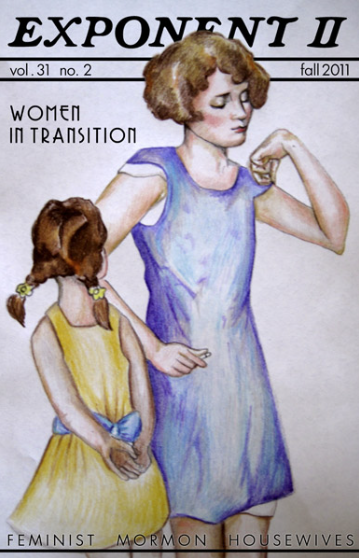
AA: Yep, for sure. And I guess that would move us to the next wave. Let’s come back to Sonia Johnson. I want to dig into her work, especially into her book, Celeste, but I kind of want to talk about the wave of Mormon feminism that finally reached me. And that’s the moment that I opened with, like you just described so well, when I was machete-ing my way through the forest, feeling like I was alone and really, truly in anguish and wrestling by myself. Finally, I think somebody mentioned Exponent magazine. I looked it up, and then I found out about Dialogue, and then I heard somebody mention Feminist Mormon Housewives to me. This was in the early 2010s, 2011 maybe, and I was like a dry sponge that just soaked up every word I could get because it made me feel not alone, not crazy. But you do have these women, like Joanna Brooks was a huge, huge influence in writing things down. She has an anthology called Mormon Feminism Essential Writings, I think is what it’s called. So things started being written.
And then my dear friend Neylan McBaine, she’s a very good friend of mine, she’s one who is still in the Church and manages to walk that fine line of critiquing and challenging, but still finds that sweet spot. She’s not getting excommunicated and she’s not challenging it too much, which I appreciate. And I think there is a critical role to play in helping the Church move forward and change. I just wondered if there’s any particular person from your life, Celeste, in addition to Sonia Johnson, who helped you formulate a critique and helped you feel not so alone as you were on your journey. Who did you find first?
CD: Gosh, good question. Well, I remember reading The Ghost of Eternal Polygamy by Carol Lynn Pearson. Again, Carol Lynn Pearson was who I was like, “Okay, scratch the old model. New model: Carolyn Pearson. That’s going to be the goal.” I had never encountered someone who was a member of the Church but who outright said, “I disagree that polygamy came from God.” I did not know that was an option. I didn’t know I could still go to church and be like, flat out, “I don’t think polygamy is from God.” I was like, “That’s an option? Oh, me too!” I had never thought that. Okay, great. I dissent. I say no to that. And that was really empowering. That was an empowering moment for me. I just didn’t know that was an option. I just thought I had to keep those thoughts to myself and silently, secretly be like, “I don’t think that’s true and I don’t think that God would want that.” But to hear her adamantly be like, “I’m a member of this Church and I sustain the prophet and I do not think polygamy is from God” was really empowering to me.
AA: Yeah, me too. I don’t know how she has evaded discipline, to be honest. She transcends things somehow. She’s now elderly, and hopefully she’ll stay with us for a long time. But yeah, she’s such a hero of mine. I have to say, too, Exponent II is the first place I ever published anything.
CD: Really?
AA: Mm-hmm. When I found that article by Claudia Bushman, that gave me the courage to write my very first article, having been an English major, but then I got married young, had four kids young, did the whole Mormon thing. And I was in such pain about the temple, like deep agony about the explicit subjugating language of the temple ceremony. And I wrote an open letter to the brethren and published in Exponent II, and that was a really important moment for me because I got some pushback from people who were close to me. Like, really bad reactions that were really painful for me personally, but it kind of ripped the band aid off a little bit. Like, what’s the worst that can happen? That was pretty bad, but now people know what I really think. And then I waited awhile before I published anything else, but Exponent II gave me that community of like-minded women, and also an opportunity to dip my toe and publicly say what I think. I’m so grateful for their work, Exponent II.
CD: Absolutely. It’s so powerful to read someone else’s words and not feel crazy, to feel seen and heard. And it’s so powerful to claim your own voice. And to voice it, and then to also get feedback from people like, “Thank you, I feel the same way.” It’s such a powerful thing.
AA: Yeah, it really is. Okay, I want to hear a lot about Sonia Johnson. Because again, like I said, this was the person that I’m like, “Who is this horrible she-devil that I keep hearing about? What did she do that was so awful?” Reading your Substack article was so eye-opening, and you posted about her on Instagram, too. So, tell us everything that we need to know and what we have not learned about Sonia Johnson.
CD: Well, this is such a funny case study, I guess, because I went in knowing nothing at all. Literally not a thing. Actually, it does say she’s excommunicated on the cover of her book, so I did know that. And I had already stopped going to church by the time I read it. But I know for a fact that if I had read it even two years before, I would have had a completely different opinion on this book. I wouldn’t have read it, I’d have been like, “Oh, she’s so critical. She’s so angry.” It was an interesting experience reading it, because she talks about this exact thing, about how angry women are demonized. And we are taught a million different times and in a million different ways to discredit the angry order. If their voice is angry, their opinion isn’t as valid. And I absolutely would have discounted the entire book, honestly, if I had read it even two years before I read it. So, that’s interesting.
And also, I think Kate Kelly is the Sonia Johnson of our generation. And it’s interesting to think that the girls now, who were just little and who couldn’t remember their moms talking about her, they’re not going to know who she was. They’re going to come across the New York Times articles and be like, “Why did no one tell me about Kate Kelly?” And for me, I think if I had read Kate Kelly… It’s interesting how you sometimes don’t question the biases that were formed years and years before. It would have hit me differently because I think I formed those biases for where I was at in 2014 that I don’t carry now. But anyway, it’s an interesting experience. Everyone’s going to have a different experience reading this book based on where they’re at with the Church.
But for me reading it, my impression was that she was just like me in how devout she was. She was so innocent, almost, in her faith in the institution and the brethren. She totally thought that as soon as they are educated, everything’s going to change. The only problem is that they’re uninformed, and once we inform them everything’s going to change. And then she outlines her disillusionment with that. Oh no, they know our issues. And that’s not an issue of being informed at all. And she goes through, in such visceral, raw detail, the heartbreak. You could just see her heart breaking more and more as she becomes more and more disillusioned.
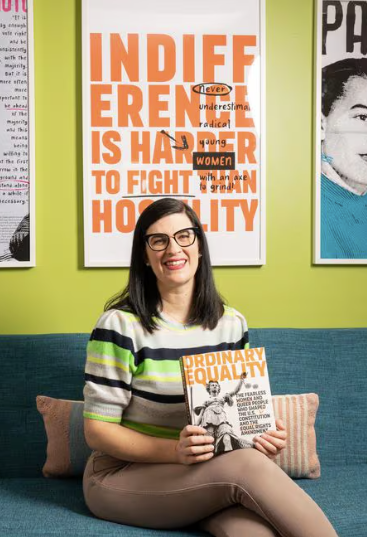
And then the smear campaign. She went to battle with the First Presidency very publicly, and things got ugly. There were also a lot of dirty dealings, a lot of secret shady stuff that was going on with her bishop and with her stake president, like weekly calls from the First Presidency to her bishop. Her bishop did not know how to handle this. It was kind of a PR nightmare all around. But it was so interesting to me and I resonated so much with where she came from and where she ended up. I went through that heartbreak with her. I went through all of the anger. Like, “How could they? This isn’t right.” And this is actually maybe illegal, what they did during the ERA, which was her point. She spoke to Congress about it and she gave this really impassioned speech called “Patriarchal Panic: Sexual Politics in the Mormon Church” at a meeting of the American Psychological Association that was outing the Church for what they were doing and stating that what they were doing was illegal.
AA: Wow. And she also flew a banner behind an airplane at General Conference that said what? Heavenly Mother…
CD: “Mother in Heaven Loves the ERA” or something. Yeah, she hired a plane. Mormon women are so creative! The priesthood protests are so creative. Trying to get into the priesthood meeting, there was a protest that women marched up and handed white roses to the brethren between conference sessions in 1993 to protest the September Six, hiring a plane to put that around, so much creative dissent.
AA: That was one of the saddest things that I had not thought about. And we’ll get into this in a minute when we talk about what’s currently going on in the church. When I wrote that very first Exponent II article it was an open letter to the brethren, as I said, because that was where I was, too. I thought surely they must not know, because if they knew that women were in this much pain then they would do something about it. They’ve probably never thought about how that temple language is set up in parallel. The men get this to God and the women get that to their husbands. I bet they’ve never thought of it, because if they had, they wouldn’t have stood for it. And that naivete in myself first, and you point out, not only have Mormon men known about this for decades, those very Mormon men, President Nelson, who is the current president of the Church, has been there since the ‘80s. They’ve known about this for so long.
And that actually broke my heart. Because I guess part of me did still feel that way. And even the work that I’m doing now, I feel like I’m trying so hard to explain to men in a way that they’ll hear, and to use empathy, and to use “I” statements, and to give the benefit of the doubt. I am working myself to the bone producing YouTube videos that will say it just right so that men will understand my pain and see that I have a point, and it’s kind of calling that attitude into question. Do you want to talk about that really quickly? Coach me, Celeste. Help.
CD: It’s just exhausting. I’ve been there too. You just want so badly for them to wake up, for them to understand. I have two thoughts on this. First, I’ve seen a lot of rhetoric in the past few weeks online in regards to the pushback against the recent Instagram post where people are saying that the brethren know the women’s issues, they just don’t care. And I don’t think that’s quite it. For me, there was a really telling moment that I read about in regards to racism. I read the book Blood Done Sign My Name about race relations in North Carolina in the 1980s. And I had had this question when I was a really devout believing member. Something that never made sense to me was, how can the Christians be the ones who were doing slavery? That seems so clear, if they were connected to Christ at all, how on earth could they– why would it be them? It should be somebody, something else, not the Christians. That’s so clearly wrong. How could they work that out in their own mind? So, in Blood Done Sign My Name in North Carolina, this author is telling about how much in his own Christian home they talked about loving the Black people. They loved them and they would give them their old clothes because they loved them so much, their nannies and their cooks who were Black. And they would be like, “We’re so nice to them and we love them. But no, they can’t protest in the street, they have to go to jail. They can’t be the same as us. They can’t have the same rights as us, they can’t go to the same stores as us.” It was still completely segregated in the 1970s and ‘80s in that city.
And something clicked in my head and I was like, “Oh, that’s kind of how they’re thinking,” in my opinion. Obviously, I don’t know how the brethren think, but I think their benevolent patriarchy goes so deep that there isn’t much of a disconnect. I don’t think they see themselves as these uncaring monsters, of course not. But I think they’re very sure in the way they view the world in terms of God signing off on how we view women and women’s roles in the home and in the world. And I think it’s more of that benevolently, like, “We love them so much. It’s not that we don’t care, it’s just that we’re very sure that this is how God wants things.” And the truth is, there have been rooms, for the past many, many, many decades, where nobody is challenging them, nobody’s questioning them. They’ve been told that they have the most access to God, and they believe they have the most access to God. And that’s just not a very healthy petri dish to grow critical thoughts or even empathy or curiosity. So I don’t think that they don’t care, that doesn’t quite hit it. But I think the benevolent patriarch gets closer.
My other thought is that I can definitely appreciate how hard it can be to just wave your arms and do some tap dances, like, “Look at this! Do you get it? Can you understand there’s so much inequality?” And this and this and this, and we point and point and point. And I had a kind of epiphany while I was watching the Barbie movie, because I went into the Barbie movie and I wanted it to wake men up. And I was like, “Do you get it now? Do you see? Do you understand?” And I was like tone policing the movie. I was like, “Oh no, you’re going to make the men feel stupid and then they’re not going to listen. They’re not going to get it now because you’re making them feel dumb.” And my epiphany was that I don’t know that this is for the men. Actually, I think it’s for the women. Because look at this woman next to me, she is sobbing. And I can see another woman who rose up in tears, and I’m crying, and we’re having this moment as women of being seen and heard. And I think that’s the point.
Because it can be exhausting to point. And you have to tone police yourself, and you have to give them the benefit of the doubt, and you have to say it just right, and then maybe they’ll listen, but that’s not even a guarantee. You have no control over what’s going on in their brain and what doors are open or shut. That is according to them and their preconceived notions, and even if you had the perfect script and the perfect words, there’s no guarantee ever. But I think it is definitely not wasted effort, and in fact, a very, very important one to gather women together and make them feel empowered and seen and heard, which your podcast does. So, thank you. I think that’s super important.
AA: I agree with you. And that was one point that you made that I thought was so beautiful in this last week or two. In the LDS Church there has been a big groundswell of women speaking about something, in fact, do you want to really quickly explain what happened and then tell us your take on it?
CD: Sure. March 17th of this year was the 183rd anniversary of the beginning of the Relief Society, the Church’s group for women. And as part of a meeting for that, there was a talk by Sister Annette Dennis, and she said as part of her talk, “There is no other religious organization in the world, that I know of, that has so broadly given power and authority to women.” And that might have gone unnoticed in her talk, but then the Church’s official Instagram account posted that exact quote, which had an immediate effect of women being like, “Say what?” Have you been to any other church? Jewish women can be rabbis, Episcopalian women can be priests, there are women pastors, clearly we are not leading the pack. We’re not at the top of this pile in terms of the world’s religions giving women power and authority. Of course, she was talking about power and authority as if the Church has God’s official power and authority and women are a part of that, so therefore they have more than other women. That’s how she meant it. But that quote alone caused a massive wave and opened the door for women to dissent, to disagree, to voice their pain. And I think a really beautiful thing happened in my mind, even though it was voicing pain, was that now I think we’re up to 18,000 comments on that post, and a lot of them from Mormon women, past and present, voicing that that’s not their experience and the Church has actually been a really disempowering place for them.
you have to tone police yourself, and you have to give them the benefit of the doubt, and you have to say it just right, and then maybe they’ll listen, but that’s not even a guarantee
AA: Yeah, 18,000 comments. And some comments have seven or eight thousand likes, right? And comments under those comments and discussion. And like I said, I think that at the beginning I was still in that mindset that the brethren are going to see this and then they’ll know. And then the Church issued a statement, I don’t remember the exact wording, but it was, “We will share this with the people who track these issues,” right?
CD: Meaning the women who can’t do anything.
AA: Yeah, totally. Exactly. The women who can’t do anything. And also just framing it in that way of “these issues”, which just made it sound like something so marginal and not important to the Church structure itself. Like the people who look at social media and trends that are going on, but it felt really dismissive to me. But your response to that, when asked if this is going to change the Church, can you tell us what you said specifically? Because people were asking, is this groundswell? Is this a grassroots movement of women saying “this hurts and this isn’t true!”, are they finally going to listen? What was your response to that?
CD: My response was just to point out the many times in the past five decades that women have voiced literally these exact same requests. The same requests that someone in the comments made, like, “Let’s gather women! This is our turn. We have the mic right now. Please, everybody say what you want to change. Go!” And there were over 400 responses asking for these same things that Sonia Johnson was asking for in the ‘70s, for women to hold their baby, for us to pray to Heavenly Mother, for women to be on the stand, all of those same things. So my response is that these aren’t just the same type of men that have seen these concerns in the past, these are these exact same men. Russell M. Nelson has been at Church headquarters as a General Authority since 1971. The Exponent II was 1974, I think, so even before then, all through Sonia Johnson, the amount he would have to have his head in the dirt to not know these issues is astounding. He would have to not read the major press that comes out after every one of these protests. So many times we’ve reached The New York Times and The Washington Post and ABC and NBC. So many times he would have had to ignore dozens of letter-writing campaigns delivered to his doorstep. He would have had to ignore, I mean, I know women have gone there and explained by mouth. He would have had to ignore books and articles that have been given to him.
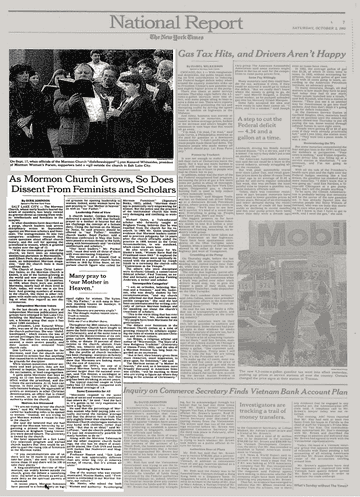
And he knows. They know. They are familiar with these requests. And again, I think in their benevolent patriarchal minds– they’re also very old, and studies have shown that you don’t have as much of an open mind, you have more of a closed mindset into your 80s and 90s. And that’s how old these men are. So, I think that they love women, and I don’t think there’s a disconnect in their mind between what they’re doing and their love for the women. But I don’t have hopes that the Church will change, because it has shown its colors again and again and again, that it’s willing to throw a few crumbs, but nothing that would even approach equality, nothing even close to it.
AA: So what good does come out of this specific thing? That’s my first question. What good does come, if any? And then what should women do? What would be your advice on how we should direct our efforts?
CD: Yeah, my article said, “Will the Church change as a result of 15,000 women speaking out? No. But the women will.” So I see this whole thing as a big success. I see that comment section as the Barbie movie of Mormon women. As this collective being seen and understood, not from the Church, but from each other, which can be so healing. What I see as success is when women believe in themselves, when they believe their own experience. I see it as a success when women use their voices, when they speak out, when they speak their truth with authenticity, without apology, without fear. That’s a massive success. And as you said, and as I’ve said, those moments in our lives where we finally got the courage to be like, “I disagree and this is my experience and this is really painful. And this is my lived experience regardless of how many times you tell me it’s not. It is! I don’t feel equal and I feel that it is painful for you to tell me that.” That’s so powerful. That’s such a powerful moment. And I think a lot of women had those moments this week. So I see it as a big success because what I want for women is for them to grant themselves authority and to honor their own desires over the obedience and submission to men. I want them to honor themselves and to believe themselves. So I do see this as a big success.
AA: I love that, Celeste. Because that empowerment, that sense of sovereignty and adulthood, you carry that wherever you go, into whatever room you go. A lot of those women are going to stay in the LDS Church for their entire lives, and they carry that into the room where they’re negotiating with the bishop over a calling or whether they’re bringing it into the workplace or their school or the bedroom in their most intimate relationship. That inner strength, the deconstructing of the patriarchy in our own minds, if we can start there and do that inner work, it ripples out and it will change society eventually. And it helps us to be healthy and to self-actualize as adult human beings.
CD: Amen. Amen to that. It’s that self-trust piece that I’m really excited to see blossom.
AA: Me too. Well, that just about brings us to the end of the episode. I’m wondering if you have anything else that you’d like to share, any final thoughts.
CD: Yeah, I have this quote that sums it up pretty well, I think. It’s kind of long and it’s from Terry Tempest Williams, who wrote the book When Women Were Birds. And after being floored that I didn’t know who she was, I Googled her, and one of the first things that came up was an open letter that she wrote to the First Presidency in 2014 as a result of the Ordain Women movement. And I just felt so seen and heard when I heard her say this, and this was, again, waking me up to my own history. So I’ll read that. She said:
“Why is asking to grant half of its membership equal power under God viewed as apostasy? Why is a vision to ordain women worthy of disciplinary action and excommunication when 12-year-old boys are given the priesthood? Are men and women not equal under God’s eyes? This kind of governance is not tolerated by the United States of America, and it should not be tolerated by those of us who are members of the Church of Jesus Christ of Latter-day Saints. The question must be asked: What are you afraid of? In 1977, I watched the Mormon Church undermine the passage of the Equal Rights Amendment in Salt Lake City. It is a well known and documented story. In 1979, I watched Sonia Johnson, similarly demonized and disciplined, ironically by her local congregation in Virginia, for speaking out for the rights of women, which led to her excommunication. In 1993, I witnessed Professor Cecilia Konchar Farr exercise her voice concerning violence against women at Brigham Young University. And when she spoke out on behalf of a woman’s right to choose to have an abortion, I watched her charged with violating her responsibilities as a university citizen and accused of undermining the faith of her students. She did not pass her three-year review and was denied her teaching contract. That same year, historian Laurel Thatcher Ulrich, Pulitzer Prize winning author and MacArthur Fellow was rejected by BYU’s board of trustees as a keynote speaker at BYU’s Women’s Conference. Was it because Ulrich was a founding member of Exponent II, a feminist journal for Mormon women? 1993 was also the year of the September Six excommunications. Six Mormon scholars, half of them feminists, dismembered for raising questions of sexism, homophobia, and intellectual disparities within LDS religious doctrine. This is our history.”
AA: Yeah, that’s powerful. And new information for me, even that. And I knew who Terry Tempest Williams was and I admire her so much. I had no idea she wrote an open letter in 2014. Thank you for bringing that to our attention. Thank you for bringing all of this out into the light. I’m so excited to have encountered your work, and I can’t wait to keep reading everything you write and publish. I’m so grateful for our conversation today. Thanks, Celeste.
CD: Thank you so much for making me feel seen and heard through these years, Amy.
We are at a fork in the road for women in the Church. Things have to change or all the women will leave.
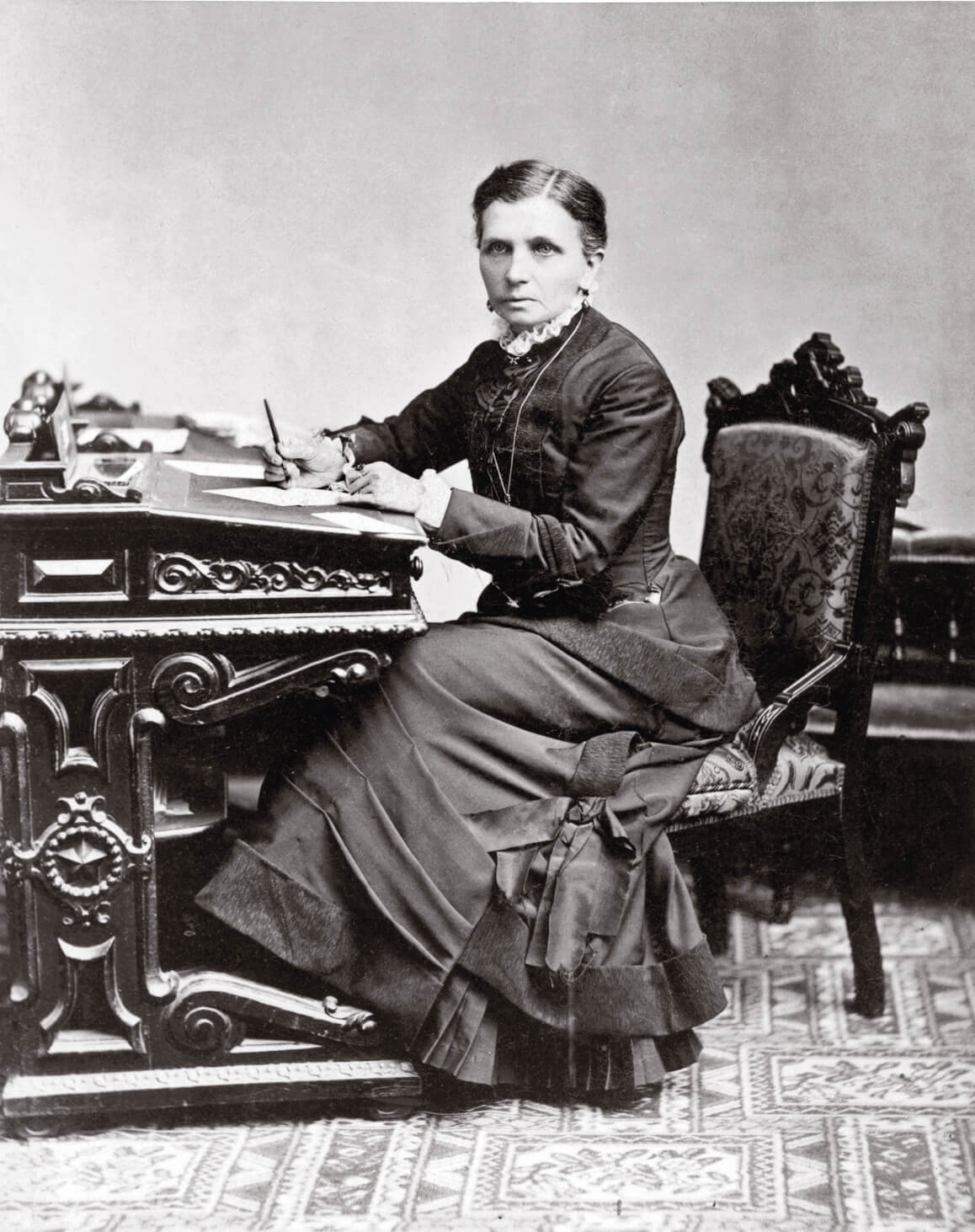
This cannot continue.
Listen to the Episode
&
Share your Comments with us below!




